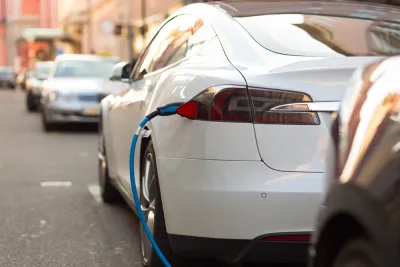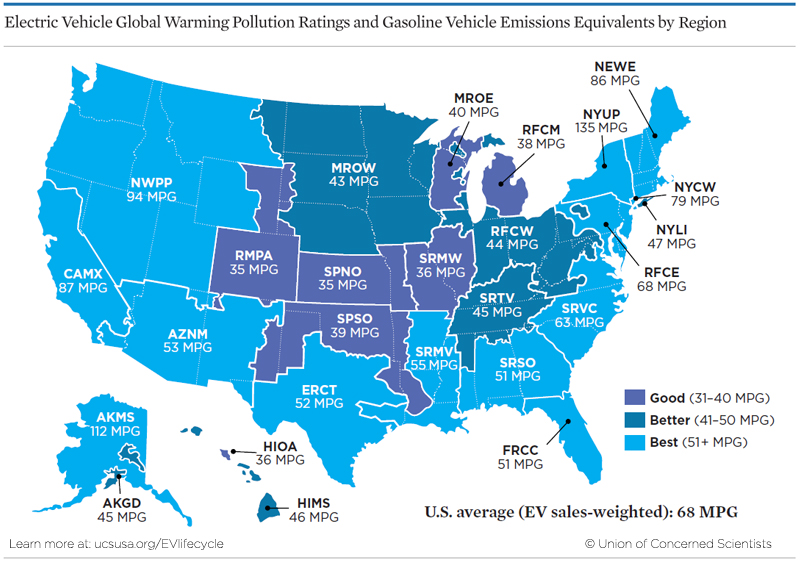A new Union of Concerned Scientists report shows that due to considerable gains made in cleaning the electric grid and in producing electric vehicles more efficiently, EVs are the environmentally sensible choice.

The UCS report, "Cleaner Cars from Cradle to Grave (2015)," considers three variables in its evaluation of lifecycle carbon emissions that includes "vehicle production, operation, and disposal":
- Regional electricity grids across the United States based on the global warming emissions produced from electricity generation,
- Emissions generated by charging an EV,
- Emissions produced by gasoline-powered vehicles.
"Two-thirds of all Americans now live in areas where driving an EV produces fewer climate emissions than almost all comparable gasoline and gasoline hybrid cars—a fact attributable to more efficient EVs and an increasingly clean electricity grid," states the introduction to the report.
The 2012 "State of Charge"report [PDF] is posted here.
To see the fuel efficiency necessary to match that of an EV, find your region on the map below:

Credit: UCS blog: How to Calculate Electric Vehicle Emissions by ZIP Code and Model
The lowest fuel efficiency on the map is in Kansas with 35 mpg. The average fuel efficiency for a new passenger car in the United States is 36 mpg; for a light truck, it's 25.3 mpg, according to the Department of Transportation.
The utilities move away from coal to natural gas and renewables played a critical role in making electric vehicles cleaner. Coal-powered electricity "emits between 1.4 and 3.6 pounds of carbon dioxide equivalent per kilowatt hour (lb. CO2e/kWh)," writes USC policy analyst Josh Goldman, policy analyst. "Natural gas, by comparison, emits between 0.6 and 2 lb. CO2e/kWh."
The report accounts for the fact that "BEV [battery electric vehicle] production results in higher emissions than the making of gasoline cars—mostly due to the materials and fabrication of the BEV lithium-ion battery," writes Rachael Nealer in her UCS blog.
For an interesting read on the new report, please see David Roberts' piece in Vox.
A June CityLab article based on a working paper from the National Bureau of Economic Research presents a contrary viewpoint (posted here). The report also considers criteria pollutants and rebates given to EVs.
Hat tip: Paul Scott, EVs and Energy
FULL STORY: UCS report: Cleaner Cars from Cradle to Grave (2015)

Analysis: Cybertruck Fatality Rate Far Exceeds That of Ford Pinto
The Tesla Cybertruck was recalled seven times last year.

National Parks Layoffs Will Cause Communities to Lose Billions
Thousands of essential park workers were laid off this week, just before the busy spring break season.

Retro-silient?: America’s First “Eco-burb,” The Woodlands Turns 50
A master-planned community north of Houston offers lessons on green infrastructure and resilient design, but falls short of its founder’s lofty affordability and walkability goals.

Test News Post 1
This is a summary

Analysis: Cybertruck Fatality Rate Far Exceeds That of Ford Pinto
The Tesla Cybertruck was recalled seven times last year.

Test News Headline 46
Test for the image on the front page.
Urban Design for Planners 1: Software Tools
This six-course series explores essential urban design concepts using open source software and equips planners with the tools they need to participate fully in the urban design process.
Planning for Universal Design
Learn the tools for implementing Universal Design in planning regulations.
EMC Planning Group, Inc.
Planetizen
Planetizen
Mpact (formerly Rail~Volution)
Great Falls Development Authority, Inc.
HUDs Office of Policy Development and Research
NYU Wagner Graduate School of Public Service



























